Allahumma Inni As Aluka Al Afiyah Dua Meaning, Arabic Text, and Hadith
Advertisements
Allahumma inni as aluka al afiyah dua is very beneficial, as there are many people who do not know what it means and what is the importance of this supplication and do not know its virtue on a Muslim.
This dua is a beautiful, comprehensive supplication that the Prophet Muhammad (peace be upon him) taught to seek Allah’s pardon, protection, and overall well-being. It’s a deep request for Allah’s care in every aspect of our lives—our faith, worldly matters, family, and safety from all directions.
Let’s explore the meanings and benefits behind each part of this dua to better understand its value and purpose.
Allahumma Inni As Aluka Al Afiyah Dua Meaning In English
The meaning of allahumma inni as aluka is O Allah, I seek Your pardon and my wellbeing in this world and the next. O Allah, I seek Your pardon and my wellbeing in my religion, in my worldly affairs, in my family and in my wealth. O Allah, conceal my faults and preserve me from anguish . O Allah, guard me from what is in front of me and behind me, from my left, and from my right, and from above me . I seek refuge in Your Greatness from being struck from beneath me.
Allahumma Inni As Aluka Al Afiyah Full Dua In Arabic
اللَّهُمَّ إِنِّي أَسْأَلُكَ الْعَفْوَ وَالْعَافِيَةَ فِي الدُّنْيَا وَالْآخِرَةِ، اللَّهُمَّ إِنِّي أَسْأَلُكَ الْعَفْوَ وَالْعَافِيَةَ فِي دِينِي وَدُنْيَايَ وَأَهْلِي، وَمَالِي، اللَّهُمَّ اسْتُرْ عَوْرَاتِي، وَآمِنْ رَوْعَاتِي، اللَّهُمَّ احْفَظْنِي مِنْ بَيْنِ يَدَيَّ، وَمِنْ خَلْفِي، وَعَنْ يَمِينِي، وَعَنْ شِمَالِي، وَمِنْ فَوْقِي، وَأَعُوذُ بِعَظَمَتِكَ أَنْ أُغْتَالَ مِنْ تَحْتِي”.
Advertisements
Transliteration/ Pronounciation
Allahumma inni as’alukal afwa wal afiyah fid-dunya wal-akhirah. Allahumma inni as’alukal afwa wal afiyah fi dini wa dunyaya wa ahli wa mali. Allahum-mastur ‘awrati, wa amin raw’ati wahfazni min bayni yadayya, wa min khalfi, wa ‘an yamini wa ‘an shimali, wa min fawqi, wa ‘audhu bika an ughtala min tahti
The shorter version of this Allahumma Inni As Aluka Al Afiyah is O Allah, I ask You for forgiveness and well-being in this world and in the Hereafter.
Arabic Text: اللَّهُمَّ إِنِّي أَسْأَلُكَ الْعَفْوَ وَالْعَافِيَةَ فِي الدُّنْيَا وَالْآخِرَةِ
Transliteration: Allahumma inni as’alukal-‘afwa wal-‘afiyah fid-dunya wal-akhirah.
Allahumma Inni As Aluka Al Afiyah Hadith
It was narrated that Ibn ‘Umar said: The Messenger of Allah (saas) never abandoned these supplications, every morning and evening:
Allahumma inni as’alukal-‘afwa wal-‘afiyah fid-dunya wal-akhirah. Allahumma inni as’alukal-‘afwa wal-‘afiyah fi dini wa dunyaya wa ahli wa mali. Allahum-mastur ‘awrati, wa amin raw’ati wahfazni min bayni yadayya, wa min khalfi, wa ‘an yamini wa ‘an shimali, wa min fawqi, wa ‘audhu bika an ughtala min tahti.
(O Allah, I ask You for forgiveness and well-being in this world and in the Hereafter. O Allah, I ask You for forgiveness and well-being in my religious and my worldly affairs. O Allah, conceal my faults, calm my fears, and protect me from before me and behind me, from my right and my left, and from above me, and I seek refuge in You from being taken unaware from beneath me).
Sunan Ibn Majah 3871
Allahumma Inni As Aluka Al Afiyah Hadith Number
The Hadith Number of allahumma Inni as aluka al afiyah Dua is 3871 and it is found in Sunnan Ibn Majah.
Advertisements
Brief Commentary
- Abdullah ibn Omar reported the Prophet (SallaAllahu ‘alayhi wasallam) never used to leave out saying this supplication every morning and evening.
- When seeking Allah’s pardon, we are asking Him to forgive our sins and also wipe them off our record of deeds.
- In this supplication, we seek Allah’s pardon and ask Him for wellbeing. This is a very important thing to ask Allah, as the Prophet (SallaAllahu ‘alayhi wasallam) said, “Ask Allah for forgiveness and wellbeing, for no one is given anything after certainty that is better than wellbeing”.
- When we ask for wellbeing, we are asking Allah to save us from all trials and tribulations, to strengthen our heart and our physical state so that we meet Him free from any harm or sins. Al-Tibi said, “Wellbeing is that Allah protects you from all ailments and trials”.
- We ask Allah for wellbeing in this life and the next, therefore this encompasses all states we will be in.
- Wellbeing in this life includes protection from physical and spiritual ailments, including sins.
- Wellbeing in the next life includes protection from the punishment of the grave, terrors of the day of judgement, and to be saved from Hellfire.
- To try and cement our request, we repeat it again, clarifying that we want it in particular for our religion, our life, our family, and wealth.
- Wellbeing in our religion means to be saved from committing sins or having incorrect beliefs, and ensuring our tawheed of Allah is complete.
- Wellbeing in our life means to be saved from calamities and errors that cause us to be heedless of the remembrance of Allah or completing acts of worship.
- Wellbeing in our family means that we are all saved from trials and evil, including to be saved from having problems with each other.
- Wellbeing in our wealth is to protect it from being lost or stolen, and to be saved from spending it in a way that displeases Allah.
- As a supplementary to asking Allah for wellbeing, we also ask Him that He conceals our faults, which include everything we dislike for others to know about us
- We also ask Him to save us from anguish such that all our fears and worries depart from us and we live a peaceful life.
- For the final part of the hadith, we ask Allah to protect us from all angles. This includes the four angles that the shaytan promised to attack us from, as Allah mentions in the Qur’an that the shaytan says, {And then I shall come to them from in front of them, from behind them, from their right, and from their left}.
- In addition to those four angles that shaytan promised to attack us from, we also ask Allah to protect us from the remaining two angles, which are from above us and from beneath us.
- The request to be saved from beneath us is a stronger request, as those who are attacked from beneath them are usually those punished by Allah e.g. the Pharoah and Qarun, so we are asking Allah to protect us from committing something that deserves for us to be punished in this life by Him.
Allahumma Inni As Aluka Al Afiyah Benefits
- Always ask Allah for pardon and wellbeing as it is from the greatest gifts you can receive.
- The whole supplication is encompassed within the first few words as it is all encompassed within asking Allah for pardon and wellbeing, however, we repeat this request and detail our requirements further so that we show insistence in our request, and this is something that Allah loves.
- We also repeat and expand on this request so that we actually ponder over what we want and therefore request it from our heart.
- The shaytan tries to attack you from all angles so ensure you are always aware of his plots and you ask Allah to save you from him.
Breaking Down the Meaning and Significance
- “O Allah, I seek Your pardon and well-being in this world and the next.”
- Here, we begin by asking for Allah’s ‘afiyah, which is well-being, comfort, and peace. This request for “pardon” means we’re asking Allah to forgive us and shield us from anything that could harm us spiritually or physically in both this life and the hereafter. This part reflects the idea that true peace comes when we’re forgiven and safe, both in this world and in the eternal life.
- “O Allah, I seek Your pardon and well-being in my religion, in my worldly affairs, in my family, and in my wealth.”
- In this section, we specify the areas where we’re asking for Allah’s blessings and protection:
- Religion: We’re asking Allah to preserve our faith, protect us from doubt, and help us stay sincere and strong in our worship.
- Worldly affairs: This includes our day-to-day challenges, seeking that Allah makes things easier for us and keeps us on a straight path.
- Family: We’re asking Allah to bless and protect our loved ones.
- Wealth: We seek Allah’s blessings for the resources and sustenance He provides, and we ask that they are protected and remain beneficial.
- In this section, we specify the areas where we’re asking for Allah’s blessings and protection:
- “O Allah, conceal my faults and preserve me from anguish.”
- This is a humble plea to Allah to cover our mistakes and sins, protecting us from public embarrassment or shame. It’s a reminder of how Allah is the Concealer (As-Sattar) and that His mercy covers even the faults we’re ashamed to let anyone see. By asking to be saved from “anguish,” we’re seeking Allah’s support to stay calm, resilient, and protected from emotional or mental hardships.
- “O Allah, guard me from what is in front of me and behind me, from my left, and from my right, and from above me.”
- This part of the dua is like asking for Allah’s “shield” to surround us. We recognize that potential dangers exist from all directions, and we humbly ask Allah’s protection over us physically, spiritually, and mentally, from any harm coming our way.
- “I seek refuge in Your Greatness from being struck from beneath me.”
- Finally, this line asks for protection from unexpected, unseen harm from below. It’s a request for safety from accidents, calamities, and hidden dangers that may arise from sources we don’t see. By mentioning “Your Greatness,” we recognize Allah’s immense power, acknowledging that only He can keep us safe from all kinds of harm.
Why This Dua Is So Important
- It Covers All Aspects of Life and Faith
- This dua is beautiful because it asks for protection and well-being across every major aspect of life: religion, family, wealth, health, and safety. It’s a comprehensive supplication that aligns us with our needs in this world and the hereafter.
- A Reminder of Our Vulnerability and Dependence on Allah
- Each line is a reminder of our vulnerability. We recognize that life is full of tests and unknowns, and by asking Allah’s help in every direction, we acknowledge that we’re never truly “safe” on our own—we’re always in need of His protection.
- A Shield Against Physical and Spiritual Harm
- This dua doesn’t only address physical harm but also the unseen dangers to our faith, well-being, and peace of mind. In a world where we’re constantly facing challenges and potential threats to our mental, physical, and spiritual well-being, this dua serves as a means to gain Allah’s safeguard from all that we know and don’t know.
- It Encourages Humility and Gratitude
- When reciting this dua, we’re reminded of the countless blessings we have in our lives, like family, health, and sustenance. By asking Allah to protect and preserve these blessings, we indirectly acknowledge our gratitude and ask Allah to keep them in our lives.
Practical Tips for Reciting This Dua Regularly
- Incorporate It into Your Morning and Evening Routine
- This dua is often recited as part of the morning and evening adhkar (supplications). By reciting it at these times, we ask for Allah’s protection as we start and end our day, helping us remain mindful of His presence and our dependence on Him.
- Reflect on Each Aspect When You Recite It
- Instead of rushing through the dua, take a moment to reflect on each section. When asking for protection over your religion, think about the challenges to faith you might face. When seeking blessings for family and wealth, consider how Allah has already blessed you in these areas.
- Recite It in Times of Anxiety or Fear
- This dua can be a source of comfort and reassurance in moments of fear or anxiety. If you feel overwhelmed or uncertain, turning to this dua can remind you that Allah’s protection encompasses all that you’re worried about.
- Make It a Habit to Seek Comprehensive Protection
- Life has many moving parts, and it’s easy to overlook the importance of asking for Allah’s protection in all areas. Making this dua a habit helps us remain holistic in our approach to seeking Allah’s guidance and care.
The Deeper Meaning of Seeking Allah’s Protection from All Directions
When we ask Allah to protect us from every direction, we’re acknowledging His control over every part of creation. We’re asking Allah to guide us, guard us, and keep us in a state of safety and peace, not just physically but also spiritually.
This dua teaches us that true security and well-being come only from Allah, reminding us to turn to Him for all our needs and trust His protection.
Conclusion
This dua is a powerful tool that the Prophet Muhammad (peace be upon him) taught us to seek Allah’s pardon, protection, and well-being in every aspect of our lives. It’s a dua that acknowledges our human vulnerability while expressing our faith in Allah’s mercy and greatness.
By making this supplication a part of our lives, we place ourselves under Allah’s care, seeking a shield against all harms, whether visible or hidden.
May Allah grant us His pardon and well-being, preserve our faith and loved ones, and keep us safe from all harm, from every direction. And may He make this dua a source of comfort, protection, and peace in our lives.
Advertisements

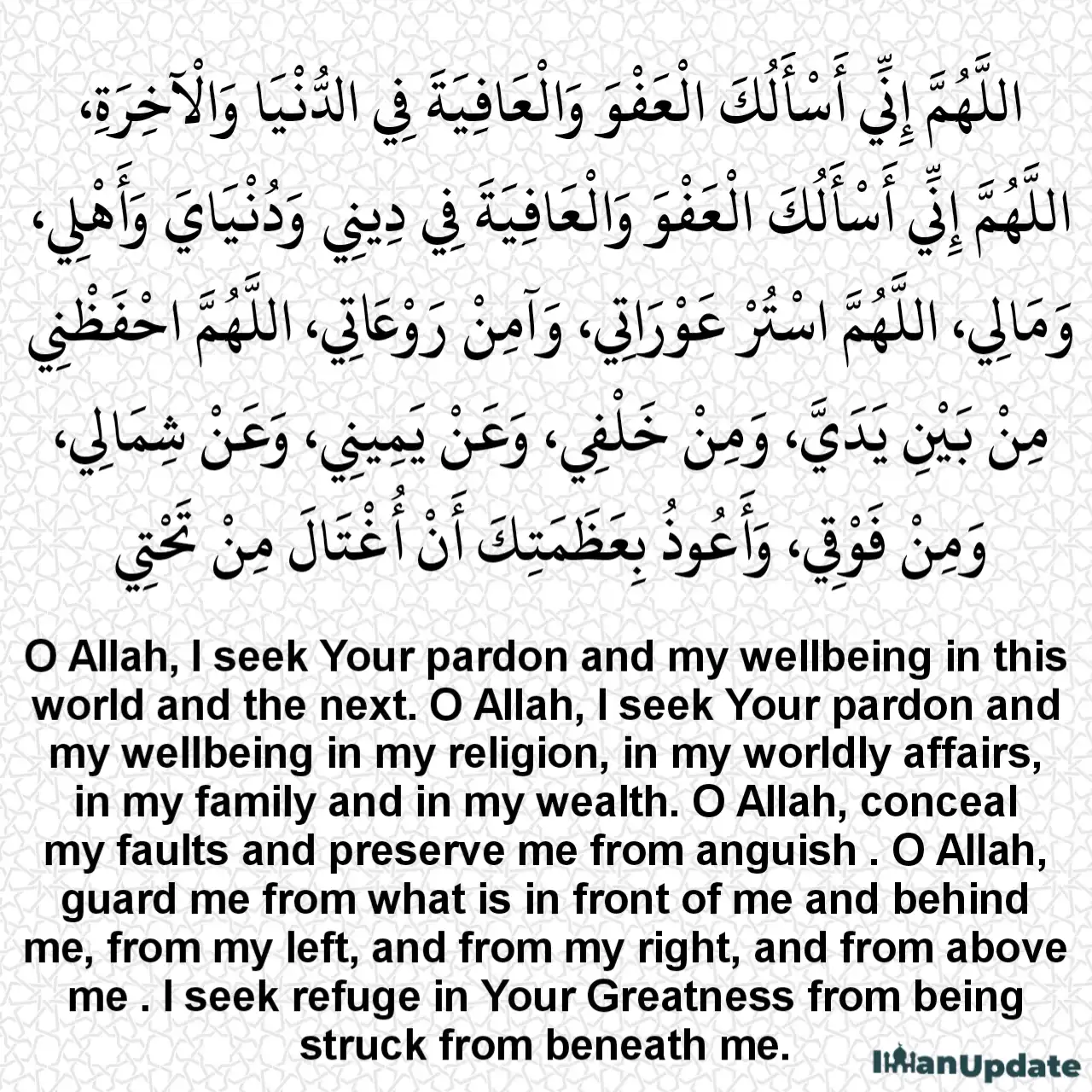
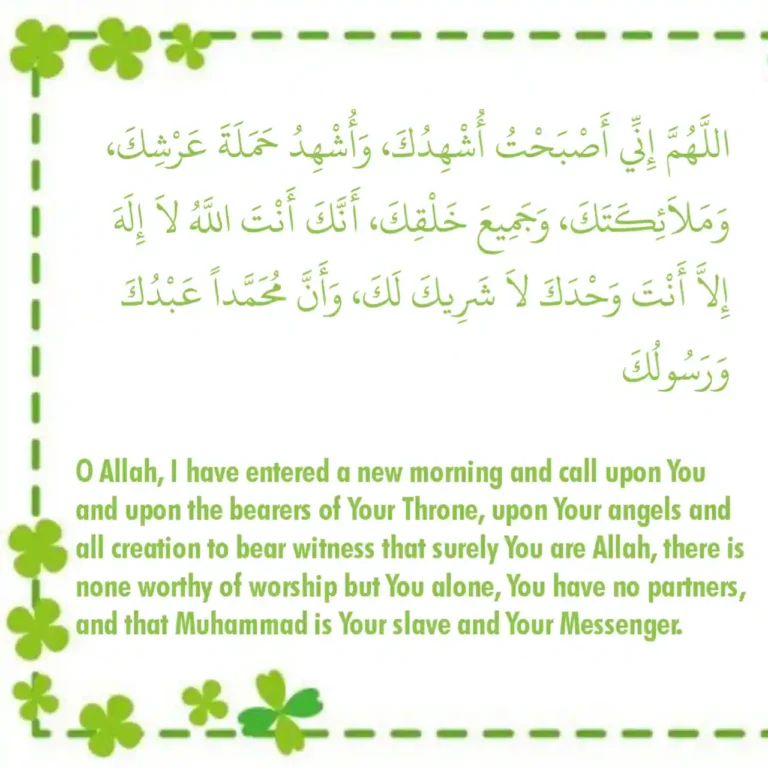
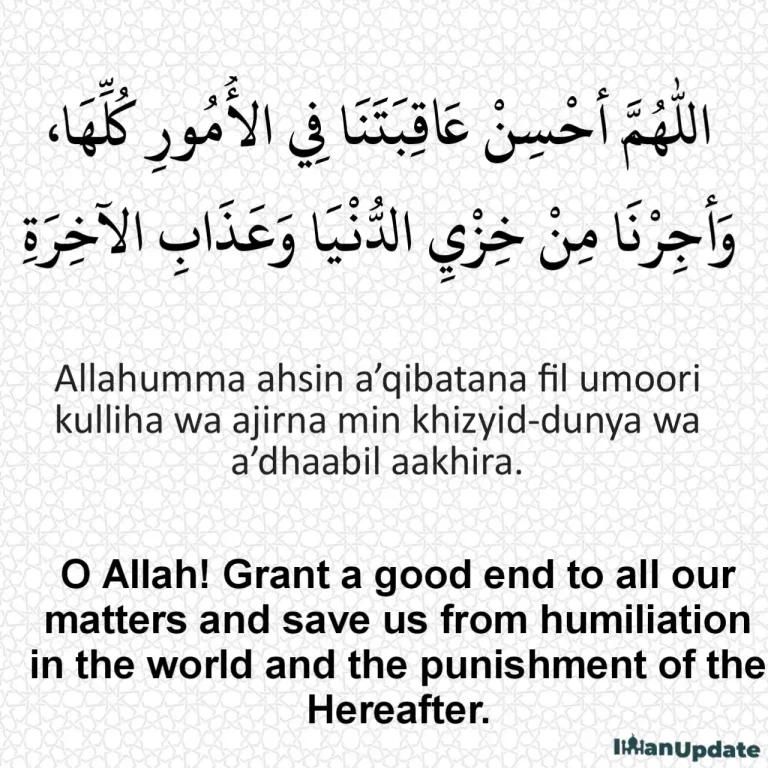
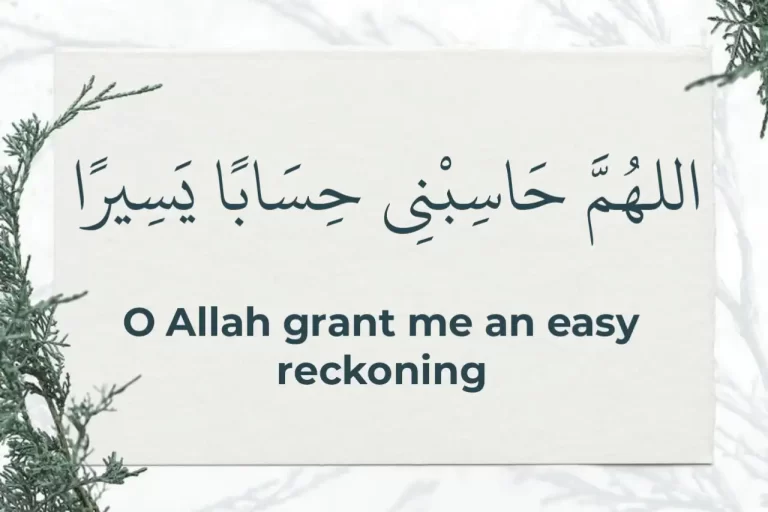
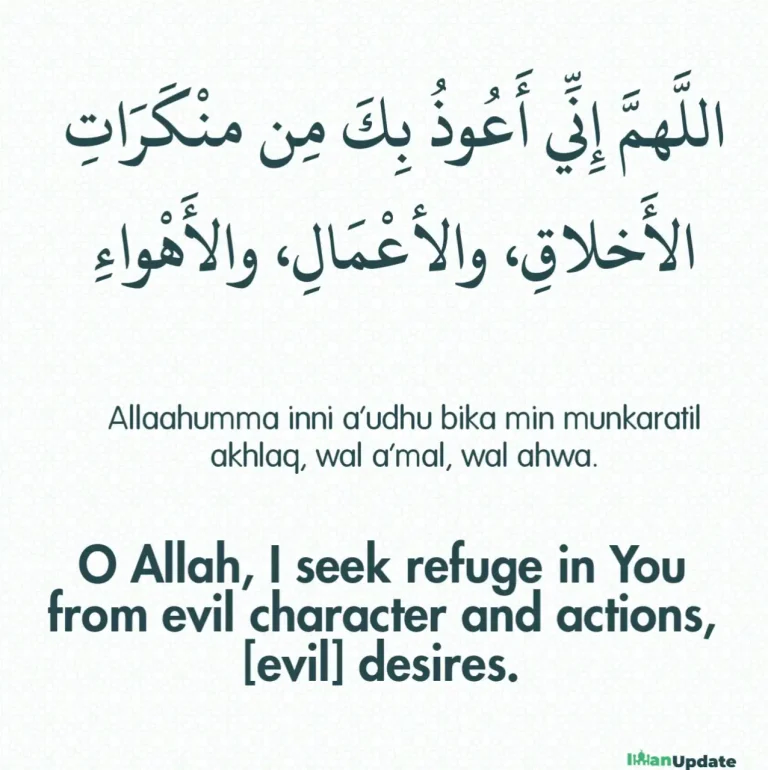
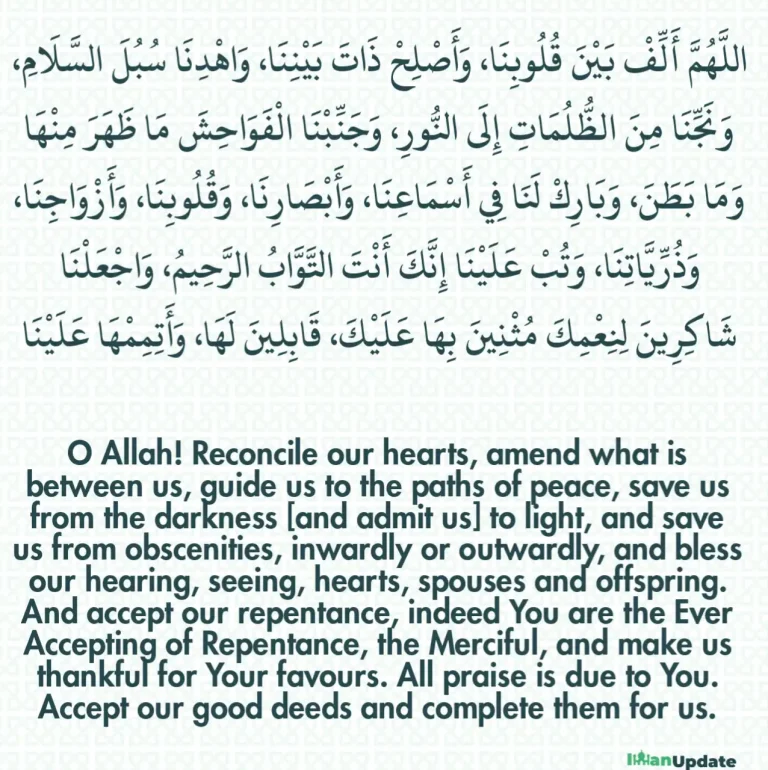
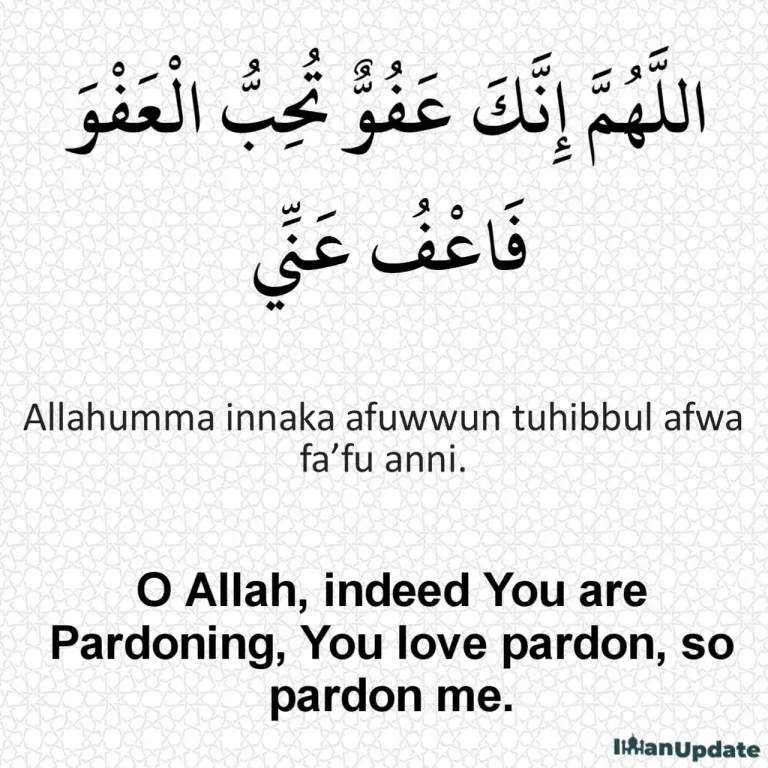
5 Comments